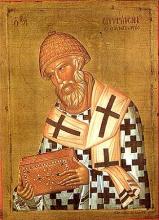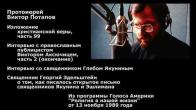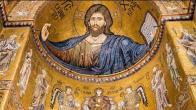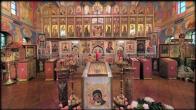You are here
Holy Hierarch St. Spyridon of Tremithus
12/25 December
 Holy Hierarch St. Spyridon of Tremithus was born at the close of the 3rd Century on the island of Cyprus. Little information about his life has survived. We know that he was a shepherd, and had a wife and children. He would give away all of his possessions to help his neighbors and pilgrims; in return for this, the Lord awarded him with the gift of working miracles. He would heal those with incurable diseases, and would drive out demons. After his wife’s death, during the reign of Emperor Constantine the Great (306-337), he was chosen to be bishop of the city of Tremithus. As a bishop, the Holy Hierarch did not alter his manner of life, combining pastoral care with acts of charity. According to church historians, in the year 325, Holy Hierarch Spyridon took part in the work of the First Ecumenical Council. At the Council, the Hierarch debated a Greek philosopher who defended the Arian heresy. St. Spyridon’s simple words showed everyone the impotence of human wisdom before the True Wisdom of God: “Listen, philosopher, to what I tell you. We believe that with His Word and Spirit, Almighty God created the heavens and the earth, man, and the entire visible and invisible world out of nothing. The Word is the Son of God, who came down to earth on account of our sins, was born of the Virgin, lived among people, suffered, died for our salvation, and then was resurrected, having atoned for original sin by His passion, and with Himself resurrected the human race. We believe that He is of One Essence with, and is equal in honor to, the Father, and we believe this without any evil fabrication, for this mystery is beyond comprehension to human reason.”
Holy Hierarch St. Spyridon of Tremithus was born at the close of the 3rd Century on the island of Cyprus. Little information about his life has survived. We know that he was a shepherd, and had a wife and children. He would give away all of his possessions to help his neighbors and pilgrims; in return for this, the Lord awarded him with the gift of working miracles. He would heal those with incurable diseases, and would drive out demons. After his wife’s death, during the reign of Emperor Constantine the Great (306-337), he was chosen to be bishop of the city of Tremithus. As a bishop, the Holy Hierarch did not alter his manner of life, combining pastoral care with acts of charity. According to church historians, in the year 325, Holy Hierarch Spyridon took part in the work of the First Ecumenical Council. At the Council, the Hierarch debated a Greek philosopher who defended the Arian heresy. St. Spyridon’s simple words showed everyone the impotence of human wisdom before the True Wisdom of God: “Listen, philosopher, to what I tell you. We believe that with His Word and Spirit, Almighty God created the heavens and the earth, man, and the entire visible and invisible world out of nothing. The Word is the Son of God, who came down to earth on account of our sins, was born of the Virgin, lived among people, suffered, died for our salvation, and then was resurrected, having atoned for original sin by His passion, and with Himself resurrected the human race. We believe that He is of One Essence with, and is equal in honor to, the Father, and we believe this without any evil fabrication, for this mystery is beyond comprehension to human reason.”
As the result of their talk, this enemy of Christianity became its staunch defender, and accepted Holy Baptism. After his talk with St. Spyridon, the philosopher addressed his friends and said, “Listen! As long as debate with me rested on proofs, I would counter one proof with another, and through my proficiency in debate could rebut everything posed to me. However, when instead of logical proofs, from the lips of this Elder there came some special power, my proofs became powerless against it, for man cannot stand up against God. If any of you is able to think as I do, let him believe on Christ and together with me follow after this Elder, through whose lips God Himself spoke.”
At the same Council, Holy Hierarch St. Spyridon gave the Arians a graphic proof of the Unity within the Holy Trinity. He took a brick into his hands, and squeezed it. Immediately, flame shot up from it, water poured down from it, and clay remained in the hands of the miracle worker. Then St. Spyridon said, “Here are three elements, but the plinth (the brick) is one. So it is with the Most Holy Trinity: Three Faces, but One Divinity.”
The Holy Hierarch very lovingly cared for his flock. By his prayers, a drought was replaced by abundant rainfall, and with the constant rains, coming down in buckets, the sick would be healed, and demons cast out.
On one occasion a woman came to him with a dead child in her arms, and asked for his intercession. Praying, he returned life to the child. The mother, overcome with joy, fell dead. However, the Saint’s prayers brought her back to life as well.
It so happened that while the Holy Hierarch was rushing to save a friend who had been slandered and condemned to death, his way was blocked by a stream formed by a flash flood. The Saint ordered the flood, “Stop! So commands the Lord of the entire world, so that I might cross and save the man to whom I am rushing.” The flood obeyed, and the Saint successfully crossed to the other shore. The judge, apprised of the miracle that had taken place, greeted St. Spyridon with due honor, and released his friend to go in peace.
Another incident from the Saint’s life is known to us: He happened to enter an empty church, and, ordering the candles and vigil lamps to be lit, began the Divine Service. Having said “Peace be unto all,” he and his deacon heard in response from above a great multitude of voices exclaiming “And to thy spirit.” That choir was great and more melodious than any human choir. At every litany, the invisible choir sang “Lord have mercy.” Attracted by the sound of chanting coming from the church, people from the surrounding area rushed to the church. The closer they came to the church, the more the marvelous chanting filled their ears and touched their hearts. However, upon entering the church, the could see no one other than the bishop and a few Altar servers, and to their utter amazement, they could no longer hear the heavenly chant.
St. Symeon Metaphrastes, the author of the Life of St. Symeon, compared him in terms of hospitality to Patriarch Abraham. “You should know how he received pilgrims,” wrote Sozomen, a man who was familiar with monastic communities, and who in his “Church History” presented an amazing example from the life of the Holy Hierarch. It happened that during Great Lent a pilgrim knocked on the door of his house. Seeing that that the traveler was quite exhausted, St. Spyridon said to his daughter, “Wash this man’s feet and offer him something to eat.” But as it was Lent, there was no food stockpiled, for the Holy Hierarch “ate food only on a certain day, and remained without food on the others.” Therefore the daughter replied that there was neither bread nor flour in the house. Then St. Spyridon asked forgiveness of his guest, and ordered his daughter to fry some salt pork that was in their larder. Seating the pilgrim at the table, he began to eat, “persuading the man to follow his example.” When the man refused, saying that he was a Christian, the Saint added “All the less reason to refuse, for the Word of God says: “unto the pure, all things are pure.” (Titus 1:15)
Another account, related by Sozomen, is likewise typical of the Holy Hierarch. It was the Saint’s custom to give a portion of the harvest to the poor, and another to those in need of a loan. He would not personally hand anything out, but would merely show them the way to the storehouse, where each person could take as much as he needed, and later return the loan in the same way, without any formal accounting.
There is an account by Socrates Sholasticus about how thieves decided to steal St. Spyridon’s sheep. Late in the night, they got into the sheepfold, but immediately found themselves bound by some unseen force. In the morning, the Saint came to tend his flock, and seeing the bound thieves, prayed, untied them, and spent a long time persuading them to abandon their criminal path and to earn their food through honest labor. Then, giving each of them a sheep and releasing them, he tenderly added, “May your audacity not have been in vain.”
Quite often, St. Spyridon is compared to the Prophet Elijah, for like him, by his prayers in time of drought, which often threatened the isle of Cyprus, rain would fall. “We behold Spyridon, like an Angel, the great Wonderworker. At one time, the land greatly suffered from drought: there was famine and plague, and a great many people died, but by the prayers of the Holy Hierarch rain came down from the heavens to the earth, and the people, spared misfortune, cried out in thanks, “Rejoice, thou who art like unto the Prophet, and who hast timely brought down the rains to take away famine and sickness.”
Throughout the entire story of the Holy Hierarch’s life, one is amazed by the remarkable simple directness and power of the miracles granted him by the Lord. At the Holy Hierarch’s word, the dead would awaken, the elements would be tamed, and the idols would be smashed. By the prayers of the Church Fathers at a Council convened in Alexandria to crush the idols and pagan temples, all of the idols fell except one, the most revered idol. It was revealed to the Patriarch in a vision that that idol remained so that it might be smashed by Holy Hierarch St. Spyridon of Tremithus. Summoned by the Council, the Holy Hierarch boarded a ship, and the moment the ship reached shore and the Saint stepped upon the land, the Alexandria idol, together with all of the pagan priests, turned to dust. By that sign, the Patriarch and all of the bishops knew that Holy Hierarch St. Spyridon was approaching.
St Spyridon lived his earthly life in righteousness and holiness, and while praying, surrendered his soul to the Lord, ca. 348. In the history of the Church, the Holy Hierarch is revered on a par with Holy Hierarch St. Nicholas, Archbishop of Myra in Lycia.
Except for his right hand, which is in Rome, his relics are kept in the Church of St. Spyridon on the island of Corfu.
Relics in cathedral - monthly calendar
| S | M | T | W | T | F | S |
|---|---|---|---|---|---|---|
|
|
|
|
1
|
2
|
3
|
4
|
|
5
|
6
|
7
|
8
|
9
|
10
|
11
|
|
12
|
13
|
14
|
15
|
16
|
17
|
18
|
|
19
|
20
|
21
|
22
|
23
|
24
|
25
|
|
26
|
27
|
28
|
29
|
30
|
31
|
|
PARISH LIFE
Address of our Cathedral
While all the materials on this site are copyrighted, you may use them freely as long as you treat them
with respect and provide attribution on the Russian Orthodox Cathedral of St.John the Baptist of Washington DC.









